Vocabulary Teaching Resources
Explore vocabulary games, printable worksheets, cloze reading activities, task cards and more primary school teaching resources designed to help you help your students build their vocabulary skills!
This extensive collection of teaching resources has been created by teachers for teachers like you. Aligned to the Australian curriculum, the collection includes word-of-the-week activities, teaching presentations and more to save primary teachers time on lesson planning.
Created by expert teachers, each resource in this English collection has been carefully reviewed and curated by our team. That means it's ready to use in the classroom! You'll even find editable resources, plus differentiated options.
New to teaching this part of the English curriculum, or just looking for fresh ways to engage your students? Read on for a primer from our teaching team, including some vocabulary teaching techniques and tips for teaching this important part of the curriculum to your primary students.
What Is Vocabulary?
It may seem obvious, but let's start at the beginning.
In a primary school context, vocabulary can be defined as the set of words that a student is expected to know and understand. It includes not just the words themselves but also their meanings, spellings and how to use them in different contexts.
Teaching vocabulary at this level is focused on the development of a strong foundation of language skills, which will serve our students well as they continue to learn and communicate throughout their lives.
Vocabulary Teaching Techniques to Try in Your Classroom
Teaching vocabulary at the primary school level involves a host of different techniques to help students learn new words. Some of those include:
- Providing definitions and examples of words
- Using visual aids to help students understand new words
- Encouraging students to use new words in their writing
- Teaching students to use context clues to figure out the meaning of unfamiliar words
- Teaching students strategies to decode new words they encounter, including the introduction of common prefixes, suffixes and root words
Students need both explicit and implicit vocabulary instruction in primary school to learn new words as they will build a strong foundation of words, not just by picking them up while reading and listening to others, but also through direct instruction.
Teaching Vocabulary in Primary School
Teaching vocabulary for the first time? Here are some topics you can expect to cover, depending on your year level!
- Basic high-frequency words
- Vocabulary related to specific subjects
- Words with multiple meanings (and how to use them in context)
- Synonyms and antonyms
- Prefixes and suffixes
- Root words
- Words with irregular spellings and pronunciation
Vocabulary Teaching Ideas
Looking for some ideas to get your students excited about vocabulary? In addition to the teacher-created resources in this collection, here are a few favourite ideas from our teacher team!
Erase a Word Pronunciation Challenge
In this pronunciation game, you can select word lists related to current units or use a high frequency word list to improve student vocabulary.
Supplies
- 3 whiteboard erasers
- Vocabulary list(s)
How to Play
- Break students into three teams, and have them stand in lines in front of your whiteboard.
- Write three lists of words onto the board — one list in front of each team.
- On the teacher's signal, the first person from each team goes up to the board and reads aloud one of the words on the list.
- If they get the word correct, they erase the word and go to the back of their team's line.
- The first team to erase all of the words on their list is the winner.
A-Z Vocabulary Relay Race
This is a fun, physical vocabulary game that is great to play outdoors or in a large multi-purpose area. Students play in teams, racing to complete a list of words (one for every letter of the alphabet) around a familiar topic or theme.
Supplies
- pens or pencils
- A4 paper
- tape
How to Play
- Divide students into mixed-ability teams of 4 to 5 students.
- Students stand in a line on one side of the space. On the other side of the space, place a pen or pencil and tape to the ground a sheet of paper with the letters A-Z listed down the side.
- Choose a topic that the students are familiar with. This will be the theme for all the words the students write on their A-Z list. Alternatively, you can choose a unit you're currently studying as your topic.
- The race begins with the leader running to the paper and writing a word beginning with the letter A that is related to the theme. Once they've written the word — spelled correctly — they run back to their team.
- The next team member runs up to the paper and writes a word beginning with B, before running back to their team so a teammate can go up to write a word starting with C, and so on.
- If a student cannot come up with a word, they can call a friend to help. If they still can't come up with a word, they can call the teacher for help.
- Teams continue this word relay until they have written a word for every letter. The first team to complete their word list (and have it verified by the teacher!) are the winners.
Snake Words
In this game, students work in teams (similar to the A-Z relay detailed above) to create a word snake on the board. Students have a limited time (e.g. 10 seconds) to write their word or their team risks being eliminated.
Supplies
- 4 -5 different coloured whiteboard markers or chalk
- a timer or stopwatch
How to Play
- Split students into 4 to 5 mixed-ability teams of equal numbers.
- Have each team select a leader and send them to the classroom whiteboard.
- Team leaders should take a coloured marker and stand in a line.
- The teacher begins the game by writing a letter of the alphabet on the board, and starting the timer.
- The first team leader writes a word beginning with that letter and must complete the word within the time limit. For example, if the teacher wrote the letter G, they might write galaxy. Then they hand their marker to the next person in their team.
- The second team leader uses the last letter of the previous word as the first letter of the next word, also within the time limit. Using the example word above, the next student may write 'yoghurt.' Then they hand their marker to the next person from their team. Note: Students write the words without spaces, in essence creating a word snake. E.g. galaxyoghurt
- If a student cannot come up with a word within the time limit, they can pass it to the next team member, but you should set a limit to the number of passes each team can have. After this, the team is eliminated.
- The last team standing is the winner!
- Plus Plan
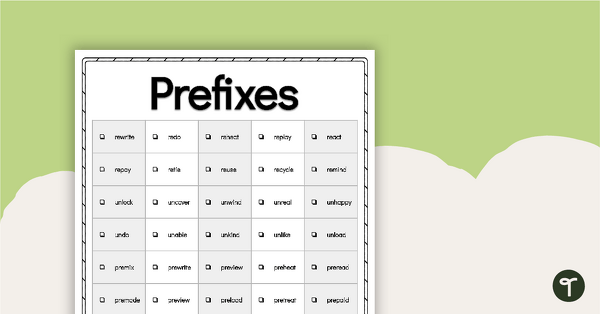
Word Study List - Prefixes
Introduce and explore common prefixes with this extensive list of words.
- Plus Plan
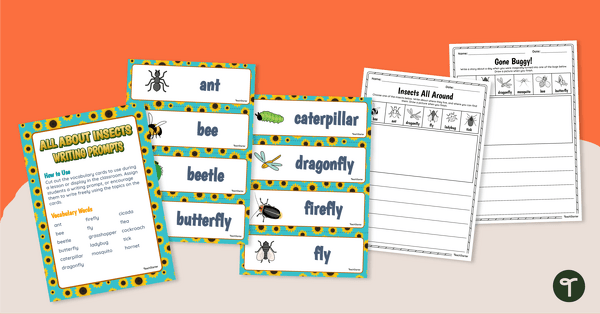
Insect-Themed Flashcards and Writing Prompts
Inspire young entomologists to read and write about insects with minibeast writing prompts and word wall cards.
- Plus Plan
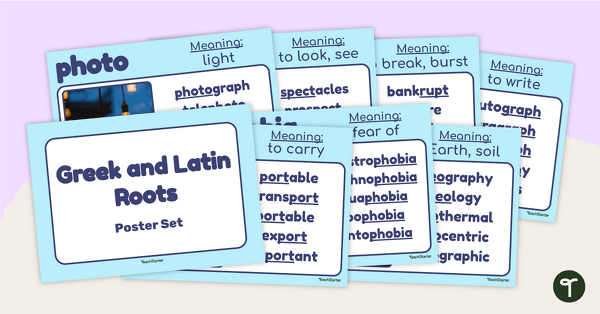
Greek/Latin Roots Posters
Encourage vocabulary development with a set of 23 Greek and Latin roots posters.
- Plus Plan
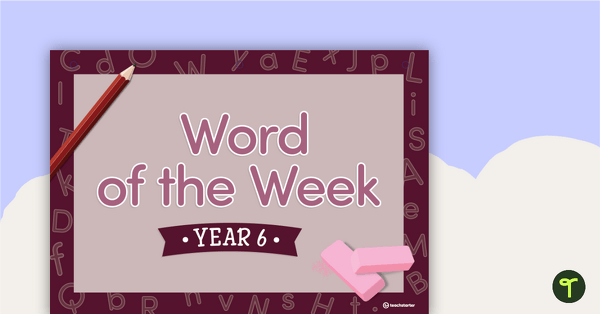
Word of the Week Flip Book - Year 6
A 43 page flip book for introducing new vocabulary to year 6 students.
- Plus Plan
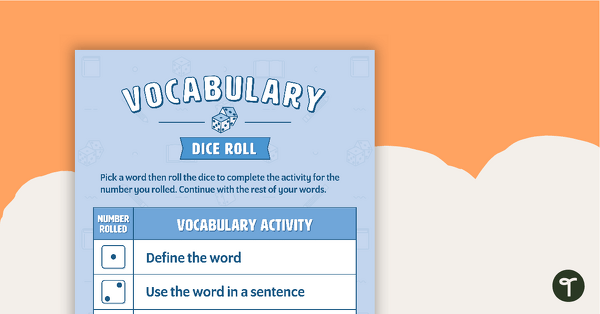
Vocabulary Dice Roll Activity
6 vocabulary activities to use with a range of words.
- Plus Plan
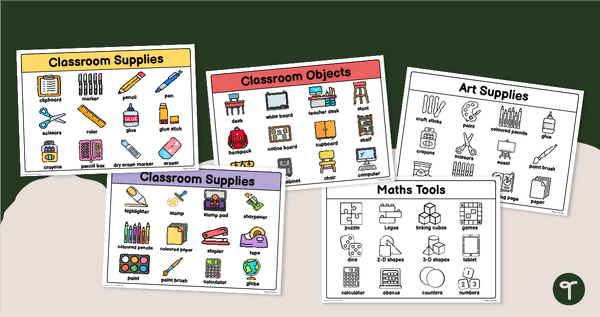
Classroom Vocabulary Charts
Kick off the new year and introduce your learners to the things in their school and classroom with vocabulary-building Classroom Word Charts.
- Plus Plan
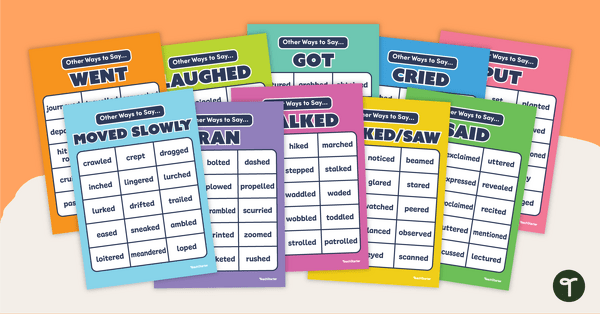
Vivid Verbs Poster Pack
Teach your students to omit boring, overused verbs from their writing with a classroom set of vivid verb posters.
- Plus Plan
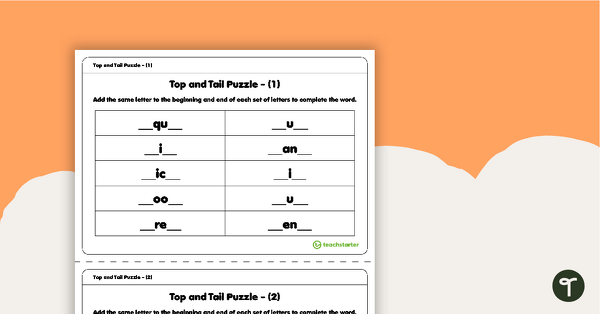
Top and Tail Puzzles
10 top and tail puzzles to use when working with vocabulary.
- Plus Plan
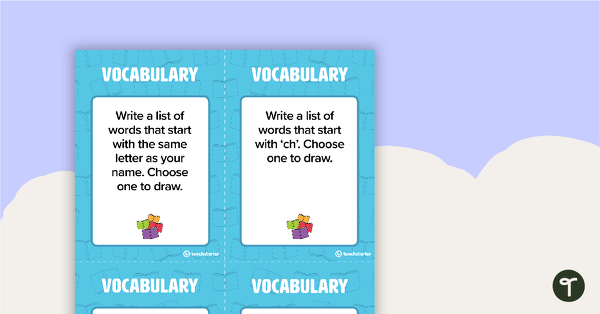
Fast Finisher Vocabulary Task Cards - Lower Grades
A set of 16 vocabulary task cards.
- Plus Plan
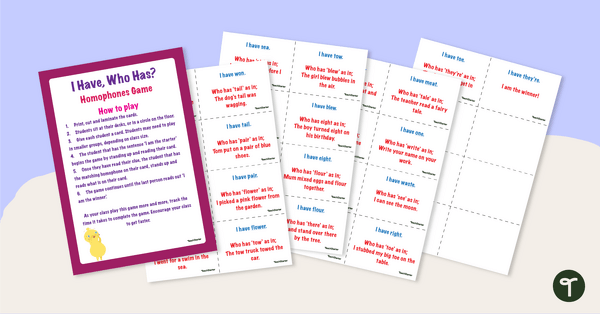
I Have, Who Has? Homophones Game
Play a whole-class game to review common homophones and their meanings.
- Plus Plan
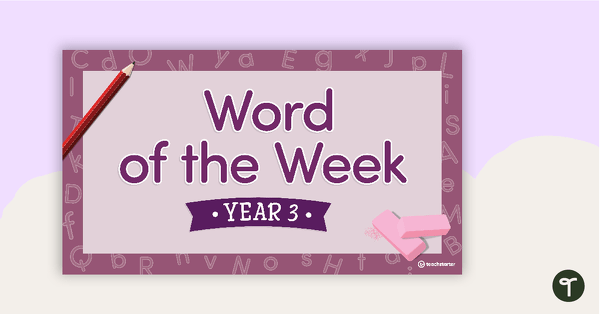
Word of the Week Flip Book - Year 3
A 43 page flip book for introducing new vocabulary to year 3 students.
- Plus Plan
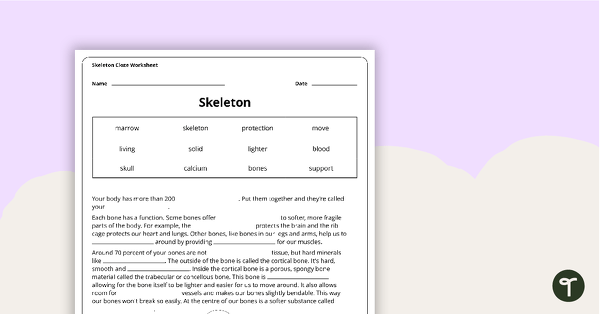
Skeleton Cloze Worksheet
A vocabulary cloze worksheet about the human skeleton.
- Plus Plan
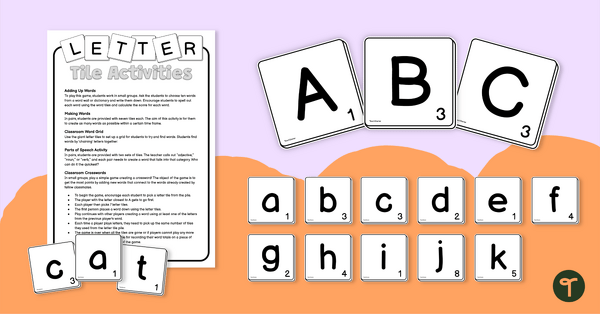
Giant Letter Tiles with Numbers
Use these giant letter tiles for a variety of vocabulary and spelling activities for your students.
- Plus Plan
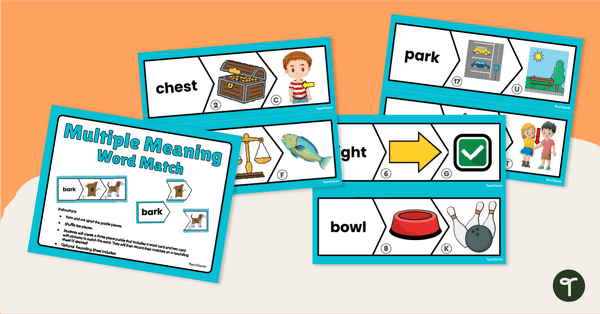
Multiple Meaning Match-Up Cards
Determine the meaning of multiple-meaning words with an engaging Vocabulary Card Game.
- Plus Plan
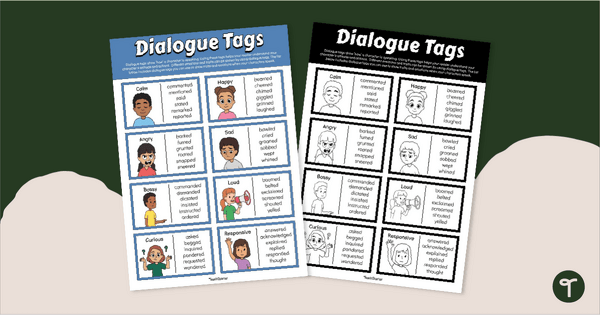
Dialogue Tags List - Vocabulary Chart
Use a Dialogue Tags list to expand your students’ vocabularies and encourage better character development in their writing.
- Plus Plan
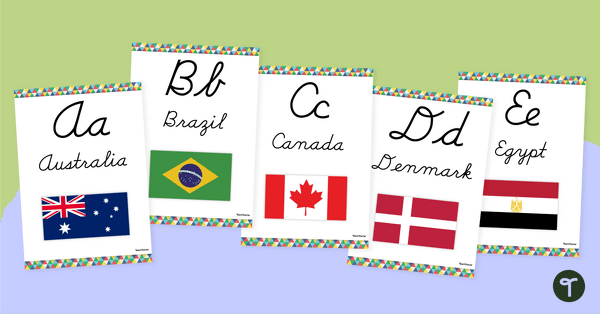
Flags of the World - Print and Cursive Alphabet Line
Display the alphabet in print or cursive with a unique Flags of the World Alphabet Line.
- Free Plan
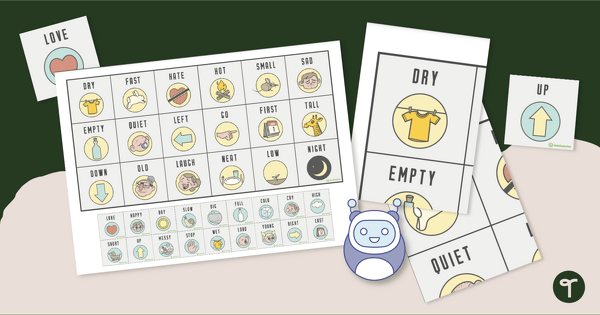
Antonym Coding Robot Mat
Practise coding for kids and matching antonym pairs with a coding robot mat.
- Plus Plan
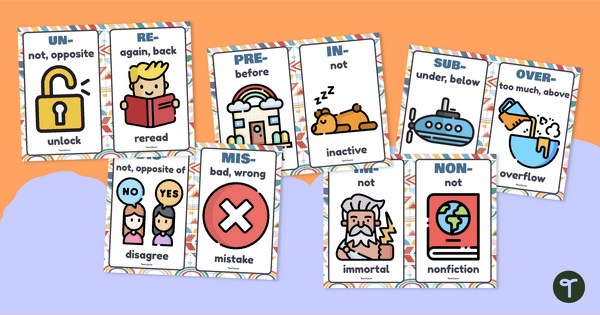
Mini Anchor Charts - Prefixes
Give your students a visual reminder of the meanings of 36 different prefixes with a printable set of miniature prefix anchor charts.
- Plus Plan
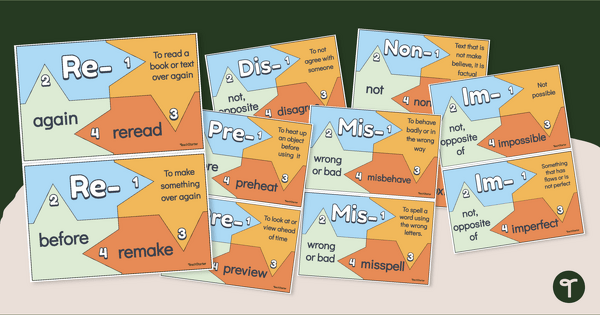
Prefix Puzzles - Literacy Centre
Grow your students’ vocabularies with prefix puzzles in your literacy centres.
- Plus Plan
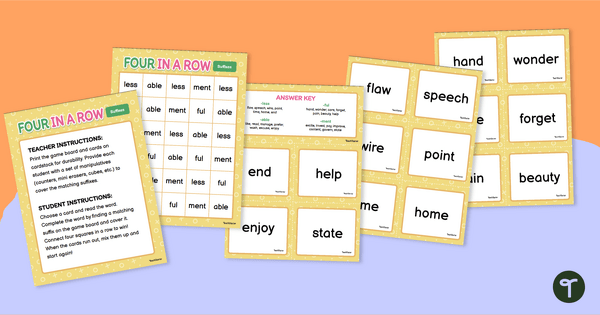
Four in a Row Vocabulary Game - Suffixes
Practise matching words to their common suffixes and build vocabulary with a suffix vocabulary game.
- Plus Plan
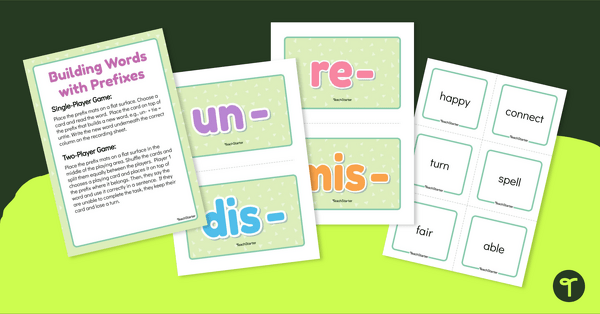
Building Words with Prefixes Sorting Activity
Build words by matching the root word to prefixes and recording the new terms on the answer sheet.
- Plus Plan
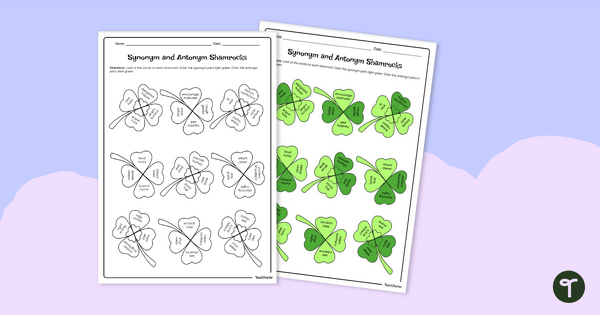
Shamrock Synonyms and Antonyms Worksheet
Build vocabulary with a Shamrock Synonyms and Antonyms worksheet.
- Plus Plan
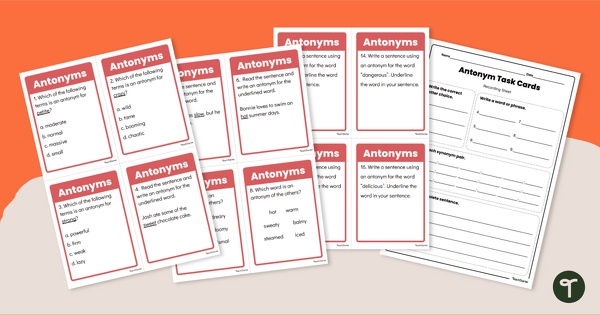
Antonyms Task Cards
Build vocabulary and recognition of antonyms with a set of 24 task cards.
- Plus Plan
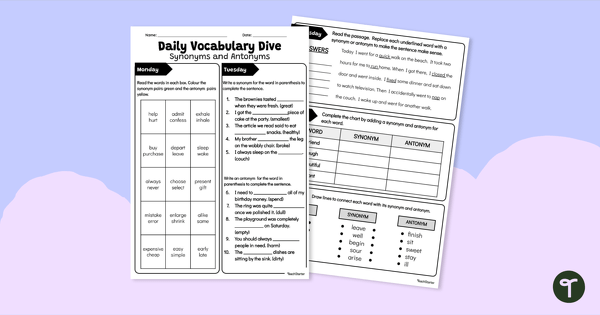
The Synonym Shop - Vocabulary Worksheet
Go shopping for synonyms with a fun “Synonym Shop” colouring worksheet.
- Plus Plan
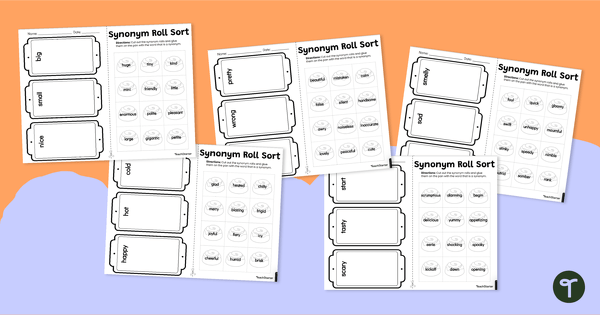
Sort the Synonym Rolls Worksheets
Encourage your kids to take a bite out of language learning with our sweet “Synonym Roll” sorting worksheets.
- Plus Plan
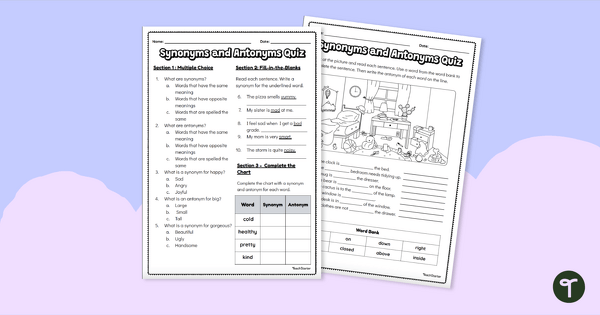
Synonyms and Antonyms Quiz
Assess your students’ knowledge of synonyms and antonyms with a vocabulary quiz.
- Plus Plan
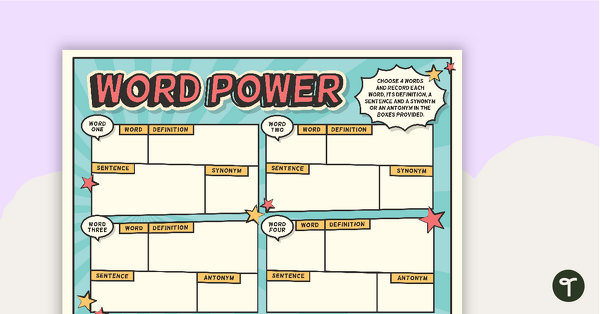
Word Power Vocabulary Worksheet
A comic book themed worksheet to use in the classroom when building vocabulary.
- Plus Plan
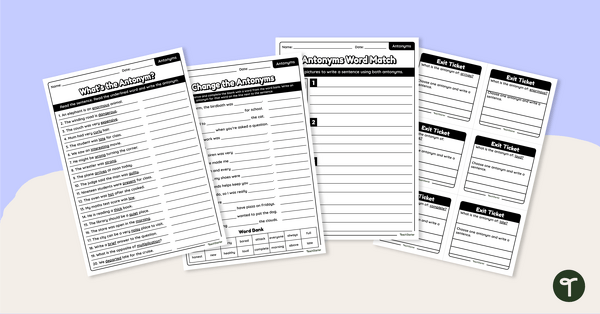
Antonym Worksheets - Middle Primary
Practise identifying and using antonyms with a set of worksheets for students in Year 3 and Year 4.
- Plus Plan
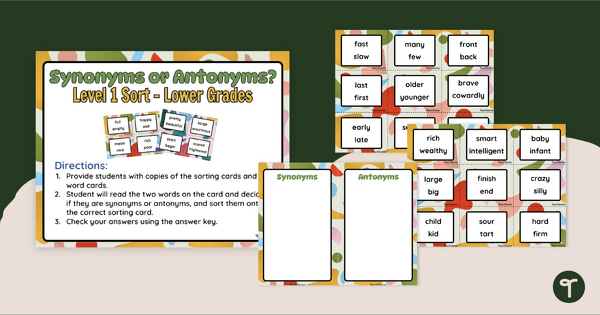
Synonyms and Antonyms Sorting Activity
Practise identification of synonyms and antonyms with a sorting activity.
- Plus Plan
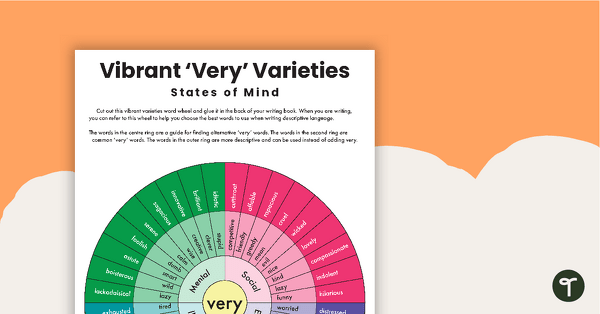
Vibrant Varieties – Other Words for 'Very' Wheel
Replace the word 'very' in your students' writings by giving them a 'wheely' good synonyms reference guide.
- Plus Plan
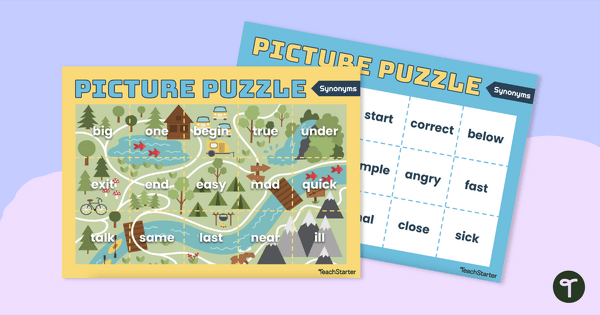
Synonyms Picture Puzzle
Build vocabulary skills with a fun Synonyms Picture Puzzle.
- Plus Plan
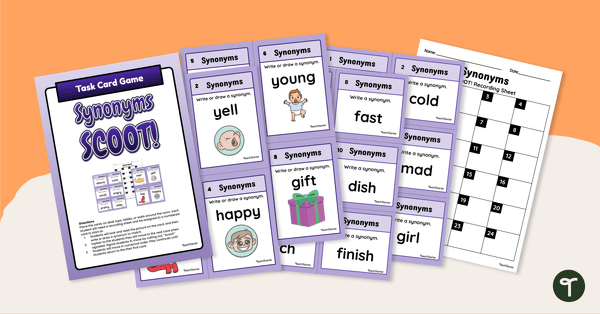
Synonyms - SCOOT! Task Cards
Build vocabulary and recognition of synonyms with a fun game of SCOOT!